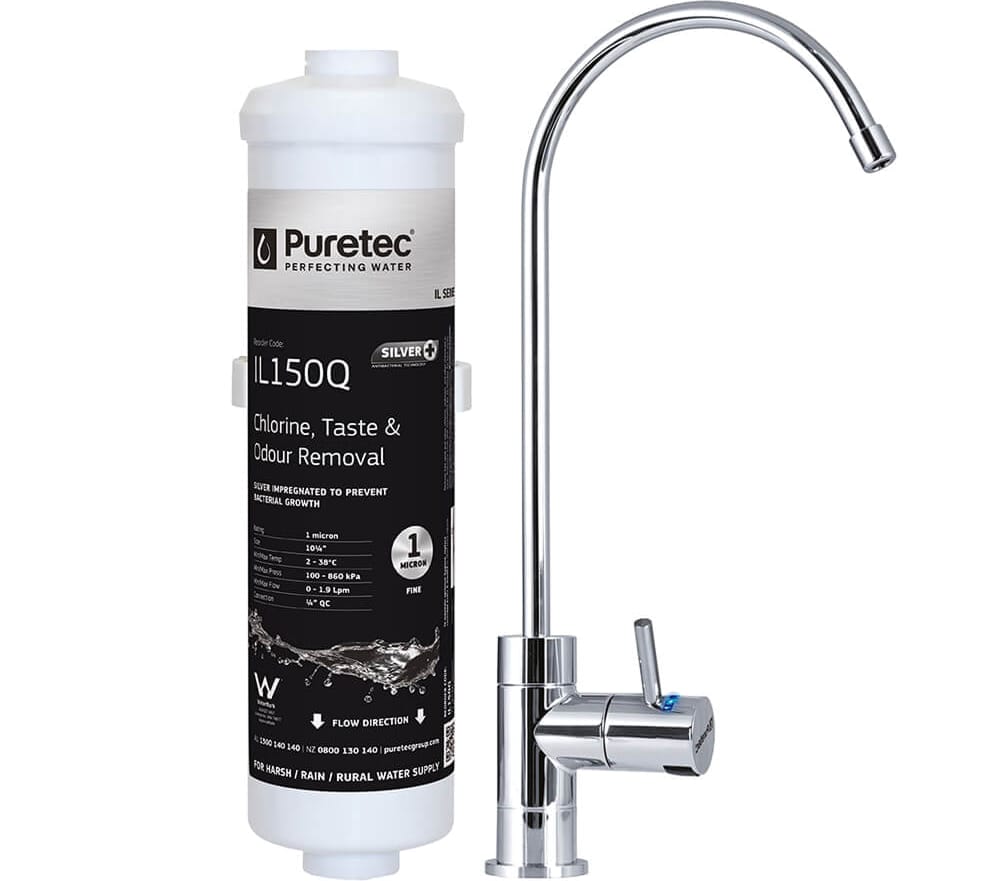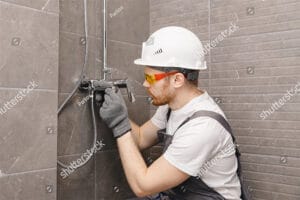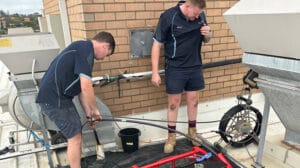Perth's drinking water system is a marvel of modern engineering that blends three distinct sources to meet the needs of over 2 million residents in one of Australia's driest capital cities. While tap water consistently meets safety standards set by the Australian Drinking Water Guidelines, many Perth homeowners notice distinctive characteristics in their water that affect everything from taste to appliance performance.
As Western Australia's climate continues to evolve, so too does our drinking water supply. Where once we relied primarily on dams filled by winter rainfall, today's Perth water flows from a diversified network of groundwater aquifers, surface water reservoirs, and state-of-the-art desalination plants. Each source brings its own profile of minerals, treatment requirements, and potential quality considerations.
Understanding these unique aspects of Perth's drinking water supply isn't just academic - it directly impacts your everyday life. From the limescale that accumulates in your kettle to the chlorine taste you might notice in your morning cup of tea, these water characteristics affect your home's plumbing infrastructure, appliance lifespan, and even your daily water consumption habits.

Perth's Water Sources
Perth's water supply system stands out as one of Australia's most diversified, drawing from three major sources to ensure reliable access despite our dry climate:
Groundwater (40%)
The Gnangara and Jandakot groundwater systems serve as crucial resources, supplying approximately 40% of Perth's drinking water. These vast underground aquifers act as natural reservoirs, slowly filled by rainfall that percolates through layers of sand and limestone.
The natural filtration process creates water with a distinct mineral profile. Groundwater typically contains higher levels of dissolved minerals, particularly calcium and magnesium, which contribute to water "hardness" – a key concern for many Perth homeowners. This hardness varies seasonally and by location, with northern suburbs often experiencing higher mineral content.
Surface Water (20%)
Perth's network of dams, including the Serpentine, North Dandalup, and Canning reservoirs, contributes approximately 20% of our drinking water. These surface water sources once provided the majority of Perth's supply but have become less reliable as climate change has reduced annual rainfall.
The water from these sources typically contains lower mineral content than groundwater but may show more seasonal variations in quality. After heavy rainfall, increased sediment and organic matter can enter the system, requiring additional treatment.
Desalination (40%)
The Kwinana (Perth Seawater) and Binningup (Southern Seawater) desalination plants represent Perth's climate-independent water source, providing approximately 40% of our drinking water. These facilities use reverse osmosis technology to remove salt and other impurities from seawater, producing high-quality freshwater regardless of rainfall patterns.
Desalinated water typically contains lower levels of minerals and dissolved solids, resulting in "softer" water that produces less scale in household appliances. However, the process removes virtually all minerals, requiring remineralisation before distribution to ensure appropriate taste and to prevent pipe corrosion.
This diverse water source mix creates variations in water quality across Perth, with some areas receiving primarily groundwater and others a blend of all three sources. In many cases, the water at your tap may come from different sources throughout the year as the Water Corporation adjusts supply based on availability, demand, and operational requirements.
Water Treatment Process
Before reaching your tap, Perth's water undergoes a comprehensive treatment process designed to eliminate harmful pathogens, remove particulates, and ensure consistent quality:
Screening and Initial Filtration
Large debris is removed from the source water, particularly important for surface water from dams and reservoirs.
Coagulation and Flocculation
Chemicals called coagulants are added to the water, causing tiny particles to bind together, forming larger particles called "floc" that are easier to remove.
Sedimentation
The heavier floc particles settle to the bottom of large clarification tanks, effectively removing a significant portion of contaminants.
Filtration
The partially clarified water passes through filters designed to remove remaining particles. For desalinated water, reverse osmosis serves as the primary filtration method.
Disinfection (Chlorination)
Chlorine is added to kill or inactivate any remaining pathogens. This residual chlorine is responsible for the distinctive taste and odour that many Perth residents notice in their tap water.
pH Balancing
The water's pH level is adjusted to prevent corrosion of pipes in the distribution system and your home.
Fluoridation
In accordance with the Fluoridation of Public Water Supplies Act 1966, fluoride is added to Perth's water supply at concentrations between 0.7 and 1.0 milligrams per litre.
Throughout this process and after water enters the distribution system, extensive monitoring ensures it meets Australian Drinking Water Guidelines, with over 150,000 water quality tests conducted annually.
Common Water Contaminants and Quality Issues in Perth
While Perth's water meets safety standards, several specific contaminants and quality issues affect Perth homes:
Water Corporation maintains chlorine levels between 0.4 and 1.0 mg/L throughout the distribution system. While essential for disinfection, chlorine creates a distinctive "swimming pool" taste that many find unpleasant. The intensity varies geographically (stronger near treatment facilities), seasonally (higher in summer), and even daily (higher in morning water).
Learn more about chlorine in Perth's water →
With calcium and magnesium levels typically ranging from 75-200 mg/L (as calcium carbonate), Perth's moderately hard water is particularly common in areas supplied by groundwater. This hardness creates scale buildup in appliances, white deposits on plumbing fixtures, reduced soap effectiveness, stiff laundry, and potential skin dryness. Scale in hot water systems can increase energy consumption by 15-30% and significantly shorten equipment life.
Learn more about water hardness in Perth →
Originating from natural minerals, aging pipes, disturbed deposits during maintenance, or internal plumbing corrosion, sediment can cause cloudy or discoloured water, visible particles, and fixture staining. Problems are often more noticeable after periods of non-use or in older homes.
Learn more about sediment in Perth's water →
Added at concentrations between 0.7-1.0 mg/L since 1968 for dental health benefits, some residents prefer to reduce fluoride levels for personal preference.
Learn more about fluoride in Perth's water →
These "forever chemicals" may be present in trace amounts in some water sources, though treatment processes keep levels within guideline values.
Learn more about PFAS in Perth's water →
While water treatment is designed to eliminate harmful microorganisms, bacteria can occasionally survive treatment processes or enter water through plumbing systems.
Learn more about bacteria in Perth's water →
These compounds can enter water supplies through agricultural runoff and may be of particular concern in certain areas.
Learn more about nitrates in Perth's water →
How Water Filtration Helps
The right water filtration system can address Perth's specific water quality challenges:
For Chlorine Removal
Activated carbon filters effectively remove chlorine taste and odour, immediately improving water palatability for drinking and cooking. Whole-house carbon filtration can also benefit showers and baths where chlorine exposure occurs through both skin absorption and inhalation.
For Hard Water
Water softeners or conditioners can prevent scale buildup, improving appliance efficiency and longevity while reducing cleaning efforts. Various technologies including ion exchange systems, Template Assisted Crystallization (TAC), and polyphosphate dosing offer different approaches based on your specific needs.
For Sediment
Mechanical filtration options ranging from simple sediment filters to backwashing systems can remove particles that affect water clarity and appliance function, preventing accumulation in aerators, showerheads, and appliance valves.
For Comprehensive Water Quality Improvement
Multi-stage filtration systems combining several technologies offer the most thorough approach for households seeking maximum water quality improvement, addressing everything from taste and odour to specific contaminants of concern.
Transform Your Home's Water Quality
Understanding Perth's water challenges is the first step, but taking action is what truly makes a difference for your home and family. We believe everyone deserves water that not only meets safety standards but also enhances daily life – from better-tasting morning coffee to longer-lasting appliances and more efficient cleaning.
We start by listening to your specific concerns, whether it's the chlorine taste that's bothering you, the scale buildup affecting your appliances, or worries about what might be in your water. Our water quality assessment isn't just about testing parameters – it's about understanding how water affects your everyday experiences and finding the right solution for your unique situation.
When you schedule a free water quality assessment with us, one of our experienced technicians will visit your home to examine your water's specific characteristics. We'll explain our findings in plain language, discuss how they relate to the challenges you're experiencing, and outline options that fit your priorities and budget. There's no obligation - just clear information to help you make the best decision for your household.
Ready to experience better water quality? Give us a call at (08) 9315 5545 or visit our website to schedule your free assessment. We serve homes throughout the Perth metropolitan area, from coastal suburbs to the hills, and everywhere in between.
Frequently asked questions
Below, we’ve compiled the most common questions about Water Filtration Perth to help you make an informed decision.
Yes, Perth's tap water consistently meets Australian Drinking Water Guidelines and is safe for consumption. Water Corporation conducts over 150,000 water quality tests annually to ensure compliance with health-based requirements. While the water is safe, many residents choose filtration to improve taste, reduce chlorine, or address specific aesthetic preferences.
Plumber Knowledge Base
How to Replace a Worn-out Toilet Outlet Washer (Flapper): A Step-by-Step Guide for Perth Homeowners
Is your toilet keeping you up at night with its constant running? That pesky sound might be more than just an annoyance – it could…
The Ultimate Guide to Toilet Repairs – Fixing Leaks and Common Problems
Flush Away Your Worries – Understanding Toilet Troubles Is that constant trickling sound from your toilet driving you up the wall? Or perhaps you’ve noticed…
Unclog with Confidence: A Perth Homeowner’s Guide to Blocked Toilet Drains
There’s nothing quite like the panic that sets in when you flush the toilet and the water starts rising instead of draining. Blocked toilet drains…
Wobble No More: A Perth Homeowner’s Guide to Fixing a Loose Toilet Bowl
Is your toilet rocking back and forth every time you use it? A loose toilet bowl isn’t just annoying – it’s a serious issue that…
Tighten Up: A Perth Homeowner’s Guide to Fixing Loose Toilet Connections
Is your toilet hissing, leaking, or just not performing as it should? The culprit might be loose connections. In this comprehensive guide, we’ll explore the…
Cracked Toilet Troubles: A Perth Homeowner’s Guide to Cistern and Bowl Repairs
Is your toilet showing signs of wear and tear? A cracked cistern or bowl isn’t just an eyesore—it’s a potential disaster waiting to happen. In…
Hear what our customers have to say:
Get in touch
Call us during business hours, send us an email or fill out the quote request form and we'll be in touch as soon as possible.
-
info@noprobs.com.au
-
(08) 9315 5545
-
3/52 Roberts St, Osborne Park WA 6017












